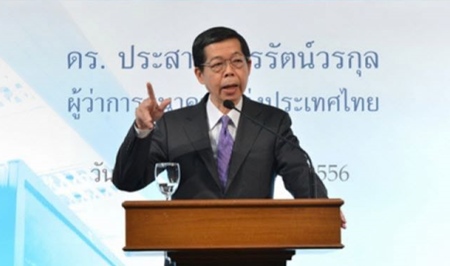BANGKOK, July 16 – Thailand’s central bank governor called on the government to accelerate the country’s long-term capability instead of solely stressing short-term economic stimulus.
Prasarn Trairatvorakul said the Southeast Asian economy is highly volatile in light of a signal by the US Federal Reserve to gradually withdraw its economic stimulus through quantitative easing (QE) within this year – a move that will result in capital outflows from the region and a successively declining baht.

China’s economy is highly prone to a slowdown in exports and investment, contributing to more concern in the global money market, he said.
In a speech on “Thailand’s Economic and Fiscal Situation”, attended by diplomats and consul generals of Southeast Asian countries, Mr Prasarn said it is necessary that Thailand simultaneously stimulates its economy in the short term and upgrade the nation’s capability in the long run.
The government has so far stressed increasing the people’s income and accelerating household spending – a short-term policy which lacks sustainability, distorts marketing mechanisms and discourages self-improvement in the private sector, he said.
He likened the short-term stimulus to a piggybacked person who leads a comfortable life and turns weak for not standing on his own feet, adding that the “piggyback policy” will weaken the private sector’s capability in the long run.
The Bank of Thailand governor said the government should seriously tackle the structural challenges including development of the mass transportation system, labour market and encouraging the private sector to improve itself with a clear vision and target directed by the state.
Policy makers should not frequently change the target and development plan to avoid a lack of continuity and they should be alert to cope with any future situation, he said.




